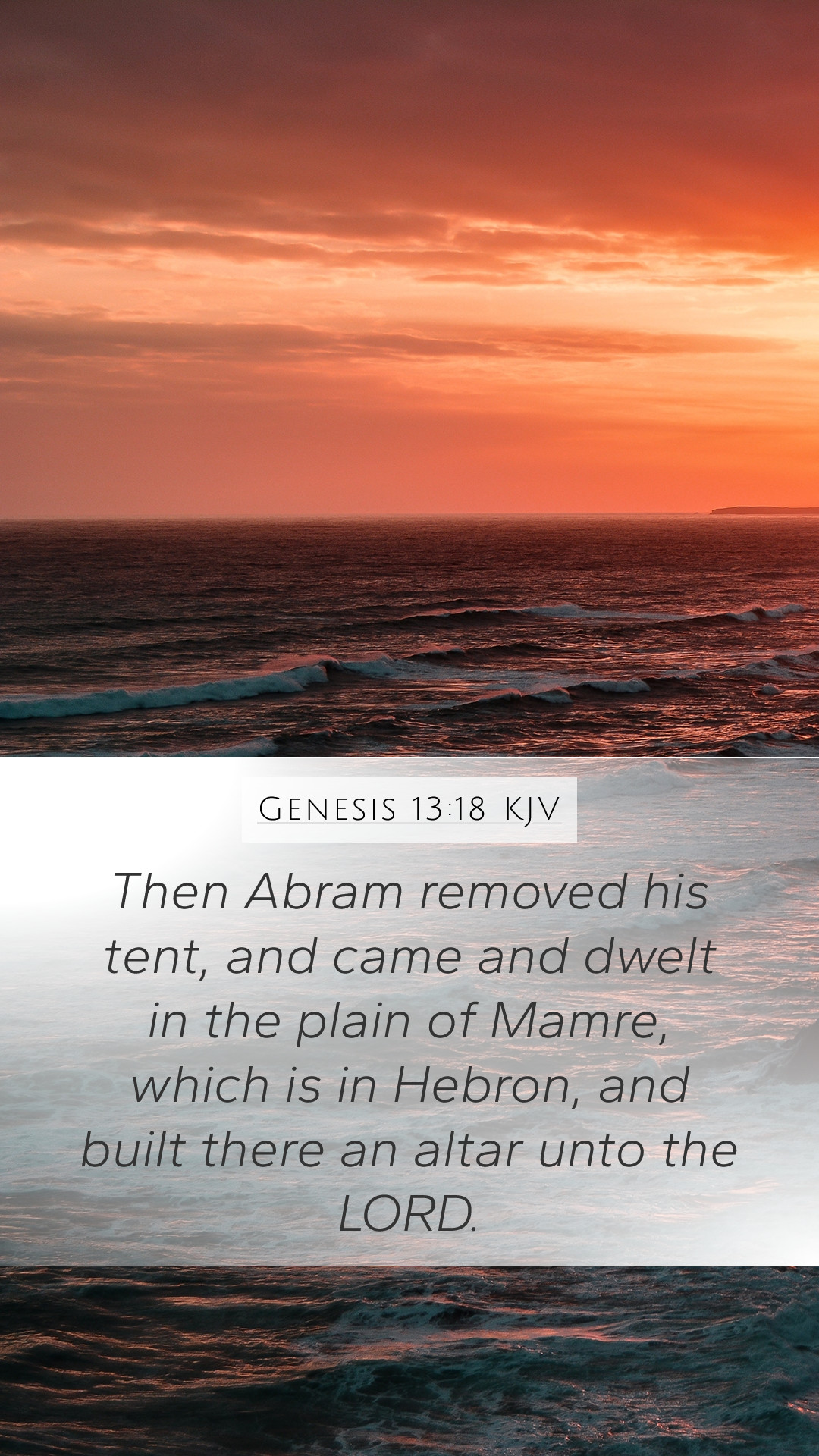Understanding Genesis 13:18
Genesis 13:18 reads: “Then Abram moved his tent, and came and dwelt in the plain of Mamre, which is in Hebron, and built there an altar unto the Lord.” This pivotal moment in Abraham's journey holds profound significance within the narrative of the Scriptures. This study aims to provide Bible verse meanings and Bible verse interpretations through the insights gained from public domain commentaries like those of Matthew Henry, Albert Barnes, and Adam Clarke.
Overview of the Verse
In this verse, we see Abram (later known as Abraham) making a decisive move after the separation from Lot, his nephew. He relocates to the plains of Mamre, near Hebron, where he builds an altar to the Lord. This action signifies both physical and spiritual transitions in Abram's life.
Insights from Commentators
Matthew Henry's Commentary
Matthew Henry points out the importance of Abram’s decision to move as an expression of faith and obedience to God. He notes:
- Faith in Action: Abram’s relocation symbolizes his trust in God's promise of land and descendants.
- Building an Altar: The act of building an altar is significant; it represents worship, gratitude, and the acknowledgment of God’s presence in Abram’s life.
Albert Barnes' Commentary
Albert Barnes emphasizes the historical and geographical context of the verse:
- Land of Promise: The plains of Mamre are situated in Canaan, underscoring the idea of divine inheritance.
- Hebron's Significance: Hebron is one of the oldest cities associated with God’s covenant with Abraham, making it a place of deep spiritual meaning.
Adam Clarke's Commentary
Adam Clarke offers a detailed analysis of the covenant aspect of Abram’s journey:
- Covenant Relationship: Abram’s actions are part of a larger narrative of God establishing a covenant with him. His movement towards Hebron is not merely geographic but a step deeper into the covenantal relationship.
- Devotion and Worship: Building the altar is portrayed as an expression of Abram’s devotion and a commitment to worship God, highlighting the theme of divine worship throughout the Old Testament.
Significance of the Verse
Genesis 13:18 serves as a crucial juncture demonstrating several themes:
- Divine Guidance: The journey of Abram reflects the broader theme of being led by God to fulfill His purposes.
- Worship as a Foundation: The act of worship is central to Abram’s response to God’s guidance, showcasing the significance of establishing a spiritual foundation in our journeys.
- Separation and Commitment: Abram’s separation from Lot symbolizes the need for individual commitment to God amid relational complexities.
Application of the Verse to Daily Life
Applying the lessons from Genesis 13:18 can offer profound insights into our own lives:
- Trust God in Your Journey: Like Abram, we are called to trust in God's direction even when circumstances change.
- Prioritize Worship: Establishing time and places for worship in our lives solidifies our relationship with God, just as Abram built an altar.
- Make Choices for Spiritual Growth: The decisions we make in life should reflect our commitment to grow in faith and relationship with God.
Bible Cross References
This verse can be related to several passages that echo its themes:
- Genesis 12:1-3: God’s call to Abram and the promise of blessing.
- Hebrews 11:8-10: The faith of Abraham as he journeyed to an unknown land.
- Genesis 28:18: Jacob’s experience of setting up a stone as a pillar after recognizing God’s presence.
Conclusion
Genesis 13:18 encapsulates critical themes of faith, worship, and the fulfillment of God's promises. By exploring this verse through the lens of various commentaries, we gain deeper Bible verse understanding and insights that can enrich our Bible study endeavors. It challenges us to reflect on our paths, our acts of devotion, and the divine partnerships we are called to develop.
Whether in Bible study groups, or through online Bible study, the lessons gleaned from Genesis 13:18 can lead to profound personal and communal growth in understanding Scripture.


